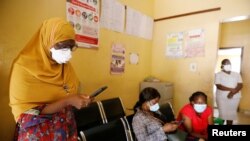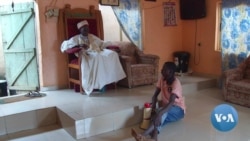As the number of confirmed COVID-19 infections in Nigeria increases, contact tracing of patients in the country’s communities is becoming more difficult for health officials. Nigeria's Presidential Task Force Committee on COVID-19 has criticized Nigerians who refuse to assist contact tracers due to fear and stigma. But in some communities, local leaders have stepped up to help the tracers do their job.
Daniel Sila is the town crier in this Mabushi village near Abuja city. Occasionally, he disseminates vital information from the village chief to people who live in the community.
But in recent weeks, his message has been about COVID-19, and ways to prevent it.
Silas said he also helps health officials with their contact tracing mission in the village.
Sila said they came in their vehicles. I wore coronavirus protection clothing with them.
This community was among the first in the Abuja region to record COVID-19 infections. Danjuma Dogo, the community secretary, said cases have increased exponentially.
"The first time was about seven cases, the second was about fourteen. The conclusion when that testing was done, I think it was about 70-something.”
Health authorities responded by conducting extensive testing in Mabushi. But as more positive cases were discovered, it became a challenge to trace them.
They sought an audience with the community heads, and officials like Danjuma Dogo were assigned to help health workers locate positive cases.
"They came with the list and we responded quickly by working together with them to fish out those ones affected. I was part of the committee and the list was with me, we had to go round, checking who and who is affected,” said Dogo.
So far Nigeria has recorded more than 41,000 cases of COVID-19. But the fear and stigma attached to the disease have limited the number of people who show up for testing or report symptoms.
Last month, the presidential task force committee on coronavirus criticized the reluctance of Nigerians to aid health workers or participate in contact tracing.
The committee says unless Nigerians change their attitudes, the pandemic cannot be brought under control.






